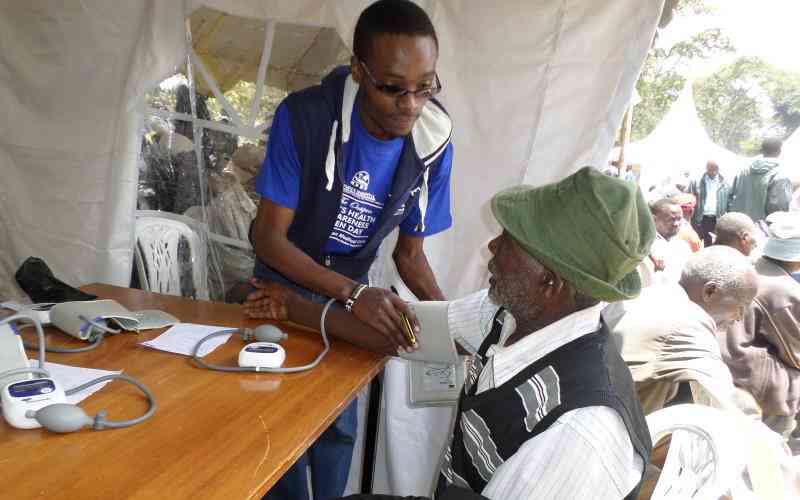
Sharon Tallam enjoyed her school years as a Bachelor of science student in Food Nutrition and Dietetics. Upon graduation, she was eager to secure a well-paying job as a nutritionist at a hospital. But this was not to be. She struggled through several unpaid internships before she could get a job.
“My dream was to work in a hospital but I gave it up to pursue teaching in the same field of nutrition and dietetics.” She narrates.
Sharon who now teaches nutrition and dietetics at the college level says the government of Kenya does not value the importance of nutritionists as they do other professions in the health sector.
“When you go to most hospitals you will find that doctors and nurses are taking up our roles, and if you find hired nutritionists, only about two will be on payroll while the others will be volunteers or on internship and without pay,” she says.
Chloe, another nutritionist intern in Nairobi, laments how they are offering free services and yet they are being over-utilised while other health professionals are paid during their internships.
According to Kenya Nutritionist and Dietitians Institute CEO David Okeyo, internships for nutritionists will be scrapped since the Government cannot commit to paying interns.
“Currently we require them to go through other programs like attachments and practicums while they are still in school to gain that experience,” said Okeyo.
- Ministries join forces with millers in food fortification programme
- Fathers defy norms, step up to end malnutrition of mothers, babies
- Why we need to shift Kenya's eating habits to nutritious farm-to-fork foods
Keep Reading
While calling upon all who have not done registration, licensing, and oral examinations to do so for ease of identification and possible employment opportunities, Okeyo argues that many nutritionists have not registered their details on the digital database and many have not been licensed, hence cannot easily get employed.
“We had a meeting with technical experts and came up with a digital database that will fit into the digital superhighway database. The regulators including KNDI have now refined the data tool that will capture all details of nutritionists in terms of their employment status and even their location in the country,” he said.
With this, Okeyo says there will be a possibility to see exactly how many nutritionists are registered and whether they are licensed or not.
“The human resource for health council will then have a database with details of the nutritionists and will be able to present employment opportunities for them”, he adds.
Okeyo says KNDI commits to be involved in transformative, multisectoral, and education matters that would consider interconnectedness between food, animals, plants, and humans.
He adds that proper nutritional education and information will help improve and enhance food safety, indigenous knowledge preservation, healthy diet, food security and planetary health towards sustainable development goals and universal health coverage.
His sentiments are echoed by George Omollo, founder and president of the Kenya Nutrition and Dietetics Students Association (KENDSA) who suggests that the government should establish guidelines that prohibit hospitals from offering nutrition services without employing sufficient nutritionists to cover the patient population.
“Regularly update nutrition-related clinical guidelines and protocols for various diseases. Nutritionists should also be involved in decision-making processes related to patient care,” said Omollo.
Omollo adds that organisations should collaborate with media outlets to disseminate accurate nutritional information widely.
According to Omollo, there is clear evidence that there is inadequate public awareness of nutrition in Kenya as many individuals lack an understanding of the critical role nutrition plays in health.
This he says is a major contributor to poor health outcomes.
“The Government should launch initiatives to educate the public on the importance of nutrition. Nutrition education should also be incorporated into school curricula from an early age to foster understanding among children”, Omollo says.
In 2020, a team of nutritionist interns filed a complaint to the Ministry of Health to pay interns but they were not happy with the response. In a letter dated March 22, 2021, and signed by Liti Wambua for the Principal Secretary, the Ministry of Health said it has not been authorized by the Public Service Commission (PSC) to budget for interns.
According to the 2023 Economic Survey, Kenya only has 4,235 nutritionists, meaning there is only one nutritionist per 11,813 people.
In 2023, the World Health Organization estimated that 148 million children experienced stunting, a condition where children don’t grow to their full potential mentally or physically, and 45 million children experienced wasting, a condition where children become weak and emaciated, leaving them at much greater risk of developmental delays and death. These are the most severe and irreversible forms of chronic and acute malnutrition.
A report by the Bill Gates Foundation shows 40 million more children will suffer from hunger’s worst effects by 2050 due to climate change, but immediate action could instead boost health, and spur economic growth.
While progress has been made in reducing stunting from 26 per cent in 2014 to 18 per cent in 2022, according to the Ministry of Health, malnutrition continues to pose a significant challenge in Kenya.
Lillian Mumina- the treasurer at Kenya Union of Nutritionists and Dieticians KUNAD in her sentiments says KUNAD will not accept the scrapping of internships.
“We have the nutrition act that indicates the importance of a one-year internship for training, development and transition into employment. With the internships scrapped off, we may not have the 2 years’ experience that is required for most employers to give us jobs,” she says.
Mumina says the government should employ at least 9,300 nutritionists if the country is to achieve universal healthcare. Mumina argues that diseases like cancer, HIV, and diabetes require adequate nutritional adherence to achieve maximum outcomes in terms of managing the diseases.
“We always complain that the burden of healthcare in Kenya is so high because we are looking at it from the wrong angle that is the curative aspect. There is a huge cost in ignoring promotive and preventive healthcare. Managing Non-communicable diseases is easier when nutritional advice is sought early,” she says.
 The Standard Group Plc is a multi-media organization with investments in media platforms spanning newspaper print
operations, television, radio broadcasting, digital and online services. The Standard Group is recognized as a
leading multi-media house in Kenya with a key influence in matters of national and international interest.
The Standard Group Plc is a multi-media organization with investments in media platforms spanning newspaper print
operations, television, radio broadcasting, digital and online services. The Standard Group is recognized as a
leading multi-media house in Kenya with a key influence in matters of national and international interest.











